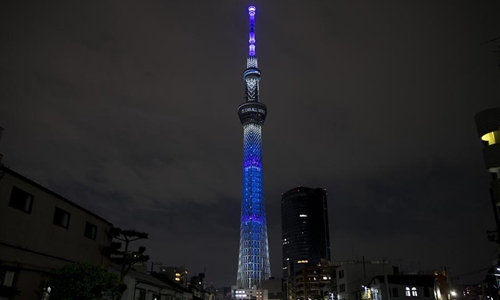Japanese exports fall most since 2009
Source:AFP Published: 2020/5/21 17:58:41

Tokyo Skytree tower is lit up in blue in Tokyo, Japan on May 5, 2020. Several landmark buildings in Tokyo have been lit in blue from mid-April to support and appreciate healthcare professionals' fight against the COVID-19 pandemic.Photo:Xinhua
Japan's exports fell the most since the 2009 global financial crisis in April as coronavirus slammed world demand for cars, industrial materials and other goods, likely pushing the world's third-largest economy deeper into recession.
The ugly trade numbers come as policy makers seek to balance viral containment measures against the need to revive battered parts of the economy, with the risk of a second wave of infections only complicating this challenge.
The central bank will hold an emergency meeting on Friday to work out a scheme that would encourage financial institutions to lend to smaller, struggling firms. Policy makers are also considering cash injections for companies of all sizes.
Ministry of Finance (MOF) data on Thursday showed Japan's exports fell 21.9 percent in April year-on-year as US-bound shipments slumped 37.8 percent, the fastest decline since 2009, with car exports there plunging 65.8 percent.
Global automakers are struggling to cope with the health crisis, which has pummeled car sales due to lockdowns in many countries. Toyota Motor Corp (7203.T) expects an 80 percent drop in full-year operating profit while Mitsubishi Motors Corp (7211.T) has reported an 89 percent drop in annual profit.
The fall in overall shipments was the biggest since October 2009 during the global financial crisis, but slightly less than a 22.7 percent decrease seen by economists in a Reuters poll. Exports fell 11.7 percent in March.
"It's still far from a fully-fledged resumption of economic activity," said Takeshi Minami, chief economist at Norinchukin Research Institute. "As exports and imports remain stagnant for a prolonged period of time, global trade will remain contractionary for the time being."
Exports to China, Japan's largest trading partner, fell 4.1 percent in the year to April, due to slumping demand for chemical materials, car parts and medicines.
Shipments to Asia, which account for more than half of Japanese exports, declined 11.4 percent, and exports to the European Union fell 28.0 percent.
Other trade-reliant economies in Asia have also been hit with data on Thursday showing South Korea's exports slumping by a fifth in the first 20 days of May, year-on-year.
AFP
Posted in: ASIA-PACIFIC,EYE ON WORLD